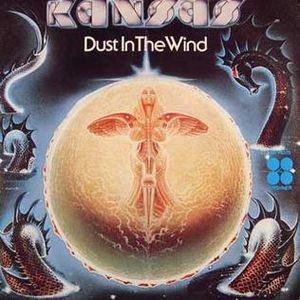Dust in the Wind facts for kids
Quick facts for kids "Dust in the Wind" |
||||
|---|---|---|---|---|
 |
||||
| Single by Kansas | ||||
| from the album Point of Know Return | ||||
| B-side | "Paradox" | |||
| Released | January 16, 1978 | |||
| Recorded | July 1977 | |||
| Studio | Woodland Studios (Nashville) | |||
| Genre | Soft rock | |||
| Length | 3:27 | |||
| Label | Kirshner | |||
| Songwriter(s) | Kerry Livgren | |||
| Producer(s) |
|
|||
| Kansas singles chronology | ||||
|
||||
"Dust in the Wind" is a famous song by the American rock band Kansas. It was written by Kerry Livgren, one of the band members, and first came out on their 1977 album, Point of Know Return. This song became a huge hit, reaching No. 6 on the Billboard Hot 100 chart in April 1978. It was Kansas's only song to make it into the top ten in the United States.
The song sold over a million copies and was certified Gold by the RIAA. Years later, the digital version of the song also earned a Gold certification.
Contents
Kansas Version
What Inspired the Song?
The title of "Dust in the Wind" comes from old writings, including the Bible. It talks about how everything we do might not last forever, like "chasing the wind." The song's message is about how life is short and that everyone eventually returns to dust. This idea is also found in other famous texts, like the Japanese war story The Tale of the Heike and some Native American poetry.
How the Song Was Made
Kerry Livgren first came up with the guitar part for "Dust in the Wind" as a practice exercise. His wife, Vicci, heard the melody and loved it, encouraging him to write words for it. Kerry wasn't sure if the rest of the band would like it because it was different from their usual rock style.
After the band had practiced all their other songs for an album, Kerry played "Dust in the Wind" for them. The band members were amazed. Rich Williams, another guitarist, remembered that Kerry played a rough recording, but even then, they knew it would be their next big song.
The song was recorded in Nashville, Tennessee. It features Kerry Livgren playing an acoustic guitar and Robby Steinhardt playing the electric violin. Steve Walsh sang the lead vocals.
Its Impact and Success
Even though another song from the album, "Point of Know Return," was first chosen as the main single, "Dust in the Wind" started getting played on the radio anyway. It quickly became very popular. On April 1, 1978, "Dust in the Wind" reached No. 10 on the Billboard Hot 100 chart. It then climbed to its highest spot at No. 6. This made it Kansas's biggest hit song ever.
Music magazines like Billboard praised the song for its "catchy melody" and "evocative lyrics." Cash Box called it a song with "solid melody, excellent vocals and harmonies, and an impactful lyric." Many people see it as a song that helped Kansas become famous not just for rock, but also for softer, more popular music.
Kansas has also released different versions of the song, including a live version and a version with an orchestra.
| Kansas band members comment on the Top Ten success of "Dust in the Wind" |
|---|
| • Steve Walsh (in 1979): "I thought ['Dust in the Wind'] would be a hit from the very first. It [defies] the basic formulas - the Boston, Foreigner, Heart formula - that most [rock] groups try to follow. They don't realize that it's not the formula [that matters], it's the song." • Phil Ehart (in 1989): "We're a hard rock band that's known mostly for a ballad we did [over] ten years ago. We're an album band & it's a fluke [if any] of our songs was a hit single." • Rich Williams (in 2010): "Our hits are hits by accident. 'Dust in the Wind' & '[Carry On] Wayward Son' aren't formula songs. They were flukes." |
Who Played on the Song?
- Steve Walsh – lead vocals
- Kerry Livgren – acoustic guitar
- Rich Williams – acoustic guitar
- Robby Steinhardt – violin, viola, backing and harmony vocals
- Phil Ehart – hand drums
Chart Performance
Weekly Charts
|
Year-end Charts
Certifications
|
|||||||||||||||||||||||||||||||||||||||||||||
Other Versions of the Song
Many artists have covered "Dust in the Wind."
- Sarah Brightman, a famous singer, recorded the song for her 1998 album Eden.
- The German rock band Scorpions also covered the song on their 2001 live album Acoustica.
The song has also been used in important ways. In Myanmar, a composer named Naing Myanmar created a protest song called "Kabar Makyay Bu" (meaning "We Won’t Be Satisfied till the End of the World"). He set it to the tune of "Dust in the Wind." This song became very popular and was used by people who wanted freedom and change in their country. It was recorded on cassette tapes and shared widely, becoming an anthem for those seeking a better future. Even recently, people in Myanmar have sung this song during peaceful protests.
See also
 In Spanish: Dust in the Wind para niños
In Spanish: Dust in the Wind para niños
 | Chris Smalls |
 | Fred Hampton |
 | Ralph Abernathy |

